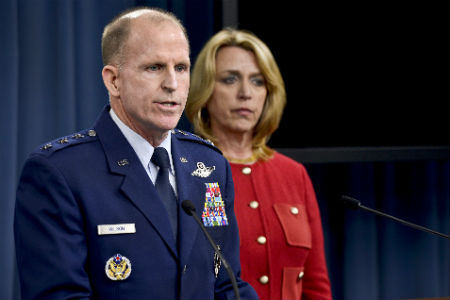 The Air Force is going to significantly change the way it trains, develops, and leads its ICBM force, Air Force Global Strike Command boss Lt. Gen. Stephen Wilson said. Although the standards will remain high, perfection will no longer be required 100 percent of the time. A command-directed investigation of the ICBM community, launched after allegations surfaced of widespread cheating at Malmstrom AFB, Mont., found that “the separation between training and evaluation” had been “lost.” As a result, USAF will place “greater emphasis” on how missileers are trained as well as improving field evaluations to “better assess crew performance in the operational environment,” said Wilson. To do that leaders are taking a cue from the aviation community. “An aircrew member takes a monthly test … called Bold Face. It’s something that they have to be able to do, no matter how stressful the situation … Missile crew members don’t have that, so we’re [going] to develop what we call Bold Face for missile crew members,” said Wilson. “And in most every flying weapons system, you get issued what we call a master question file. It’s a series of questions on the important things [you need to know] to operate that weapons system,” said Wilson, who added, “That’s a model we also think we could follow.” Finally, AFGSC is looking to mimic the 17-month evaluation cycle that is typical for flying crewmembers. “The execution of the ICBM mission has gone largely unchanged since its first missileers … started pulling alert in 1959,” said Wilson. “We’re not just putting a fresh coat of paint on these problems. We’re taking bold action.” (Malmstrom investigation report; caution, large-sized file.) (Wilson/James transcript.)
The Air Force is going to significantly change the way it trains, develops, and leads its ICBM force, Air Force Global Strike Command boss Lt. Gen. Stephen Wilson said. Although the standards will remain high, perfection will no longer be required 100 percent of the time. A command-directed investigation of the ICBM community, launched after allegations surfaced of widespread cheating at Malmstrom AFB, Mont., found that “the separation between training and evaluation” had been “lost.” As a result, USAF will place “greater emphasis” on how missileers are trained as well as improving field evaluations to “better assess crew performance in the operational environment,” said Wilson. To do that leaders are taking a cue from the aviation community. “An aircrew member takes a monthly test … called Bold Face. It’s something that they have to be able to do, no matter how stressful the situation … Missile crew members don’t have that, so we’re [going] to develop what we call Bold Face for missile crew members,” said Wilson. “And in most every flying weapons system, you get issued what we call a master question file. It’s a series of questions on the important things [you need to know] to operate that weapons system,” said Wilson, who added, “That’s a model we also think we could follow.” Finally, AFGSC is looking to mimic the 17-month evaluation cycle that is typical for flying crewmembers. “The execution of the ICBM mission has gone largely unchanged since its first missileers … started pulling alert in 1959,” said Wilson. “We’re not just putting a fresh coat of paint on these problems. We’re taking bold action.” (Malmstrom investigation report; caution, large-sized file.) (Wilson/James transcript.)
In the Space Force’s push to increase its consumption of commercial satellite capabilities, satellite communications stands out as the template. The question now is how broadly the Space Force will look to leverage additional SATCOM providers.